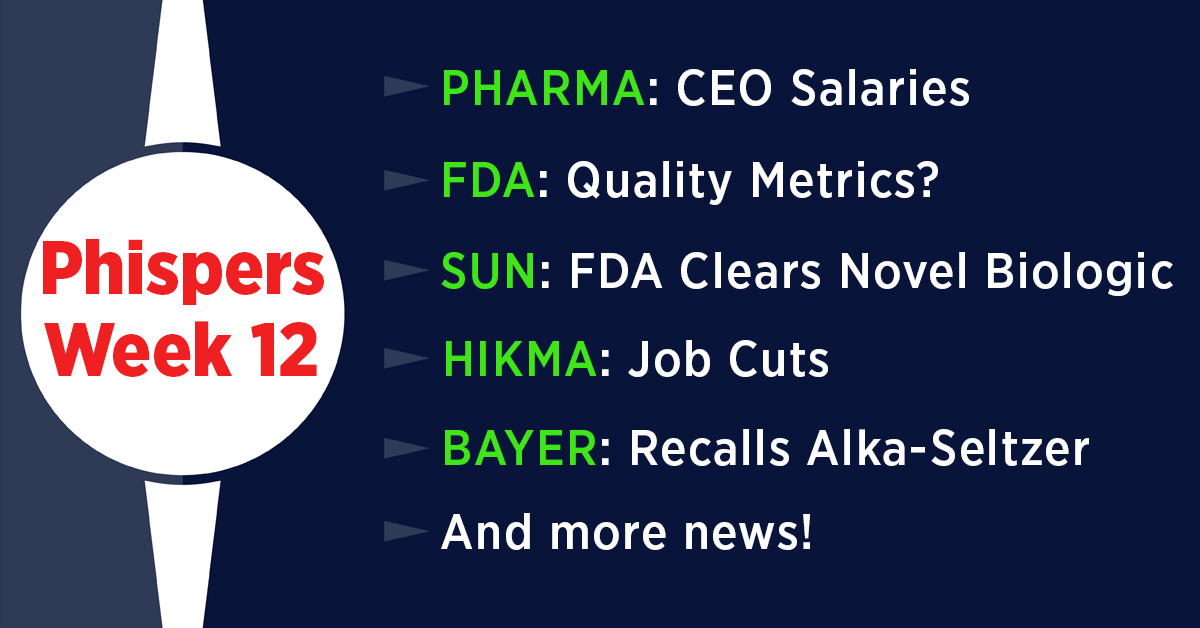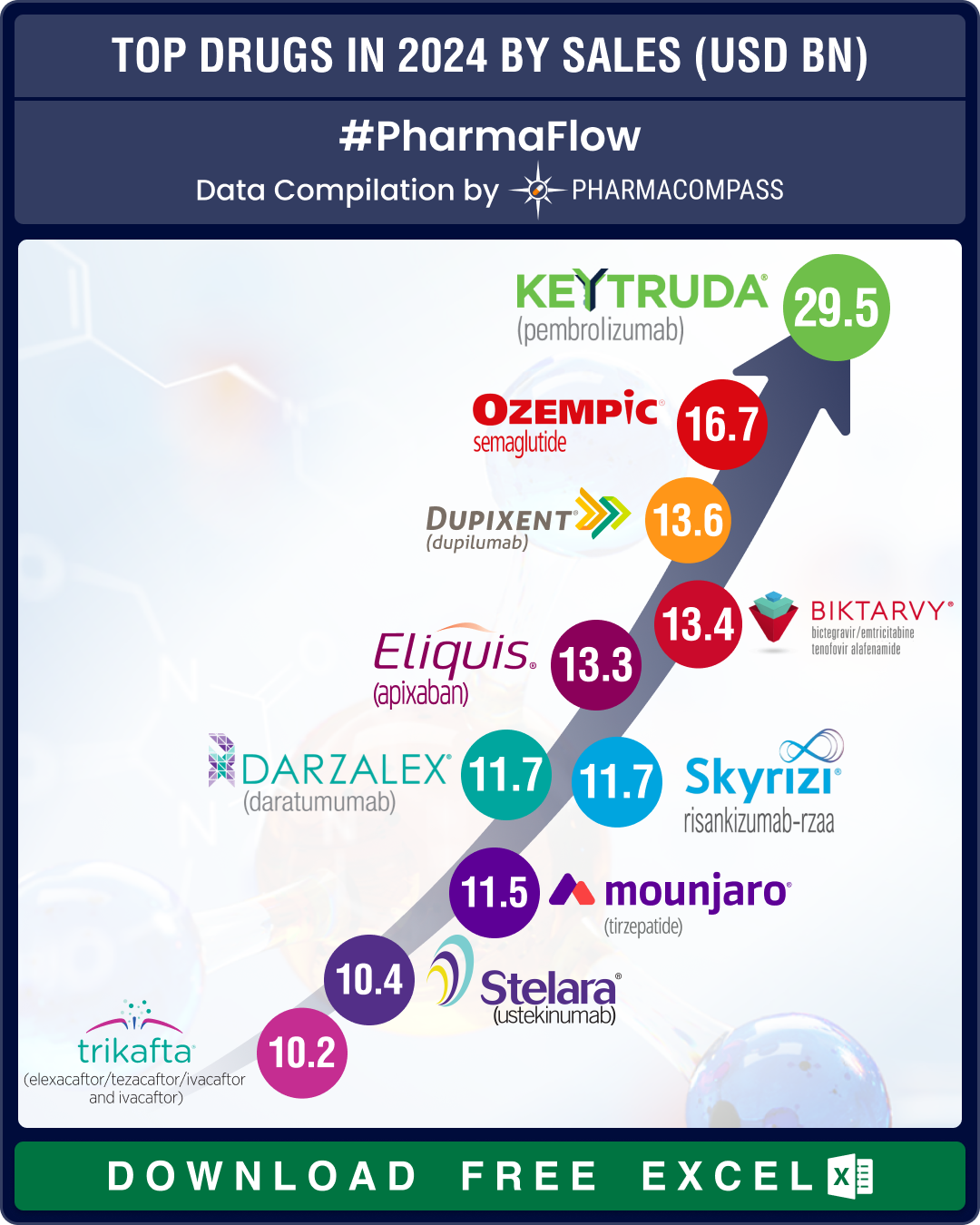
This week, Phispers brings you news on the 2017 salaries of three pharma head honchos. In the US, while the FDA remained silent on the roll out of its Quality Metrics Program, indicating it has either decided to end it or make it less burdensome for pharma companies, President Donald Trump said he would unveil a concerted campaign to roll back drug prices in the coming weeks. Meanwhile, Lundbeck acquired Prexton Therapeutics for its mid-stage Parkinson’s drug; Hikma announced more layoffs; Sun Pharma announced FDA approval of its first novel biologic; and Bayer recalled its Alka-Seltzer Plus products due to labeling error.
Sun Pharma gets
FDA approval for its first novel biologic drug
This week, India's largest drug maker Sun Pharma announced it has received the US Food and Drug Administration (FDA) approval of Ilumya (tildrakizumab-asmn), its first novel biologic drug. The injectable drug is currently approved for the treatment of adults with moderate-to-severe plaque psoriasis who are candidates for systemic therapy or phototherapy.
Sun Pharma had licensed worldwide rights to Ilumya from a subsidiary of Merck & Co in 2014 for US$ 80 million. The Phase-3 clinical trial was funded by Sun Pharma, while Merck was responsible for the completion of the clinical trials and submission of a Biologics License Application to the FDA, as well as manufacturing finished goods to support Sun Pharma's initial product launch.
Sun will be responsible for all post-approval regulatory activities, including subsequent submissions, pharmacovigilance, post approval studies, manufacturing and commercialization of the approved product.
Last year, Sun Pharma had announced it had signed another deal with South Korea's Samsung Biologics to get the drug manufactured on approval. In 2016, Sun entered into a licensing agreement with Spanish drug maker Almirall for the development and commercialization of tildrakizumab in Europe.
As Indian generic manufacturers continue to face headwinds in the United States, Sun’s recent approval could present a new business model which maybe adopted by more generic companies.
Silence on
quality metrics rollout: Does FDA plan to end this program?
There has been a virtual silence on the USFDA’s Quality Metrics Program. Back in 2015, the FDA had stated its intention of initiating a voluntary quality metrics reporting program. It had announced the publication of a draft Quality Metrics Guidance in July of the same year.
The guidance was revised in November of 2016, and the FDA had indicated that it would make it mandatory for the pharmaceutical industry. The Notice of Availability (NOA) for the revised draft guidance had stated: “After evaluating the results of the voluntary phase of the quality metrics program in 2018, FDA intends to initiate notice and comment rule-making under existing statutory authority to develop a mandatory quality metrics program.”
Post the publication of the revised draft guidance, several industry organizations had said they are opposed to the guidance, including PhARMA, AAM (formerly GPhA) and ISPE. They felt the burden of FDA metrics collection far outweighs its benefits.
However, over the last 16 months, since it has posted the revised draft guidance, the agency has been silent on the quality metrics program.
According to the FDA Law Blog, the FDA website devoted to Quality Metrics now has an updated banner that states: “the portal is not opening in January 2018 for widespread, voluntary reporting. Stay tuned for additional updates.”
“One has to wonder whether the administration, or more precisely, Commissioner Gottlieb, has either decided to end this nascent program, or to make it less burdensome and more palatable to the industry. Either way, we are confident that industry is waiting with bated breath, as whatever doesn’t get finalized in this administration is likely to be finalized in a more burdensome way in the next (Democratic) administration,” the blog said.
Pfizer CEO was paid US$ 27.9 million to stay, Allergan’s Saunders got
US$ 32 million
Pfizer Inc raised the salary of its CEO Ian Read by a whopping 61 percent in 2017 — to US$ 27.9 million — in order to ensure he stays on the job.
His pay included a special equity award of US$ 8 million that will be conferred to him if Pfizer’s average stock return tops 25 percent for 30 consecutive trading days before the end of 2022. As per the terms, Read must also remain CEO through at least March 2019 and not work for a competitor for a minimum of two years post that in order to be eligible for this special award. Read will turn 65 in May this year. He has accumulated US$ 15.7 million under two pension plans.
In a filing, Pfizer said its board approved the award because it’s a “compelling incentive” for him to keep running the firm, even though he’s eligible to retire.
Meanwhile GlaxoSmithKline’s CEO Emma Walmsley racked in US$ 6.8 million for 2017, according to Glaxo's 2017 annual report. That figure includes a base salary of US$ 1.35 million (£965,000), employee and travel benefits of US$ 3.74 million (£266,000), and pension contributions of US$ 2.74 million (£195,000). Her performance-related pay amounted to US$ 4.86 million (£3.46 million), including a cash bonus of US$ 2.16 million (£1.54 million).
In the first nine months of heading GSK, Walmsley has replaced 50 top managers. She has poached managers from top companies such as Google, Walmart and rivals like Novartis and AstraZeneca.
Meanwhile, Allergan CEO Brent Saunders received a compensation of US$ 32.8 million in 2017.
Saunders was awarded US$ 22.7 million of restricted stock, a biennial grant, about three-quarters of which will accrue to him only if the company meets goals for shareholder return as well as R&D milestones. He also received US$ 8.75 million in cash bonuses.
US to see a price drop in prescription drugs; “it’s going to be beautiful”, says Trump
During a press conference on opioids in New Hampshire, the US President Donald Trump announced his administration will unveil a slew of proposals soon to address high prescription drug costs in the country.
“You’ll be seeing drug prices falling very substantially in the not-so-distant future, and it's going to be beautiful,” he said. Trump promised to unveil a concerted campaign that would roll back drug prices. Health and Human Services Secretary Alex Azar said the administration would roll out the proposals in about a month.
“You’ve done a lot already to tackle this issue of drug pricing,” Trump said, complimenting Azar. “Last year the FDA approved more generic drugs than it ever has in its history — bringing prices down for everyone,” he added.
Speaking about Azar, Trump said he “ran an incredibly successful drug company. Who knows better than the guy running the drug company? Eli Lilly.”
Azar had once defended drug pricing strategies and called them a necessary part of backing innovation. It’s worth watching how he draws up a coherent plan to reduce drug prices.
Lundbeck acquires Prexton Therapeutics; to commit US$ 1 billion in
milestones
Denmark-based H. Lundbeck is acquiring Prexton Therapeutics for US$ 123 million. Lundbeck is also committing an additional US$ 1 billion in milestones — with more than half of that tied to sales goals. Prexton Therapeutics had been formed as a spin-off company of Merck in 2012.
The acquisition has a mid-stage Parkinson’s drug— foliglurax — at its core. The drug is in Phase II testing for the symptomatic treatment of Parkinson’s disease and dyskinesia, including Levodopa Induced Dyskinesia (LID). First data from the ongoing clinical Phase II program is expected to be available in the first half of 2019, the company said.
Anders Götzsche, the interim CEO of Lundbeck, said the acquisition will provide Lundbeck full control of the future of foliglurax. “Foliglurax addresses high unmet needs with its potential indication in Parkinson’s fitting perfectly within Lundbeck’s core areas and this treatment option also appears to be highly interesting for patients, physicians and payers,” Götzsche said.
The Phase II trial, which began in 2017, will add foliglurax to standard care of treatment for Parkinson’s disease, which includes drugs like levodopa. The primary goal of the Phase II trial is to assess efficacy, safety and tolerability of foliglurax in reducing motor complications of levodopa therapy in patients experiencing end-of-dose wearing-off and LID.
After Teva, its Hikma that’s cutting more jobs in its generic business
It’s not just Israeli generic drug giant Teva Pharmaceutical Industries that is busy downsizing. Jordan-based Hikma Pharmaceuticals Plc is following suit.
In 2017, Hikma was forced to cut the revenue guidance of its generic business thrice due to the pricing pressures in the US. The company has also reduced 200 jobs since it bought the business from Boehringer Ingelheim in 2016.
And now, the company is expected to cut more jobs in its generics business to save costs, Hikma said last week, after reporting its financials for 2017.
According to the Hikma CFO Khalid Nabilsi, it plans to cut another 200 jobs due to the consolidation of its generics manufacturing facilities and the US distribution centers. The company posted full-year generics revenue of US$ 615 million, beating its expectation of about US$ 600 million. For 2018, Hikma expects its revenue to be in the range of US$ 1.85 billion to US$ 2 billion, as compared to US$ 1.94 billion in 2017.
In a bid to improve its business, Hikma had named former Teva generics head Sigurdur Olafsson as its CEO. The company’s problems have been compounded due to the delay in the launch of its generic version of GlaxoSmithKline’s blockbuster lung drug Advair.
Labeling error over ingredients makes
Bayer recall Alka-Seltzer Plus products in US
Last week, Bayer issued a voluntary recall of Alka-Seltzer Plus products— intended to temporarily relieve symptoms associated with cold and flu — due to labeling error, a press statement said. These products were sold in the US at Walmart, CVS, Walgreens and Kroger after February 9, 2018.
According to the statement, these products can be identified by checking the Bayer logo located on the lower left corner of the front of the carton. “If the logo has an orange or green background, the product is included in the recall,” it added.
The recall is being undertaken because the ingredients on the front sticker of these packages may not match the actual product in the carton. “This may lead consumers to ingest a product to which they may have an allergy or anaphylactic reaction, an ingredient which may be contraindicated for their medical condition or they intend to otherwise avoid. There may be potential for serious health consequences. To date, no complaint has been received that resulted in an adverse health consequence,” the statement said.
The PharmaCompass Newsletter – Sign Up, Stay Ahead
Feedback, help us to improve. Click here
Image Credit : #Phisper Infographic by SCORR MARKETING & PharmaCompass is licensed under CC BY 2.0
“ The article is based on the information available in public and which the author believes to be true. The author is not disseminating any information, which the author believes or knows, is confidential or in conflict with the privacy of any person. The views expressed or information supplied through this article is mere opinion and observation of the author. The author does not intend to defame, insult or, cause loss or damage to anyone, in any manner, through this article.”






